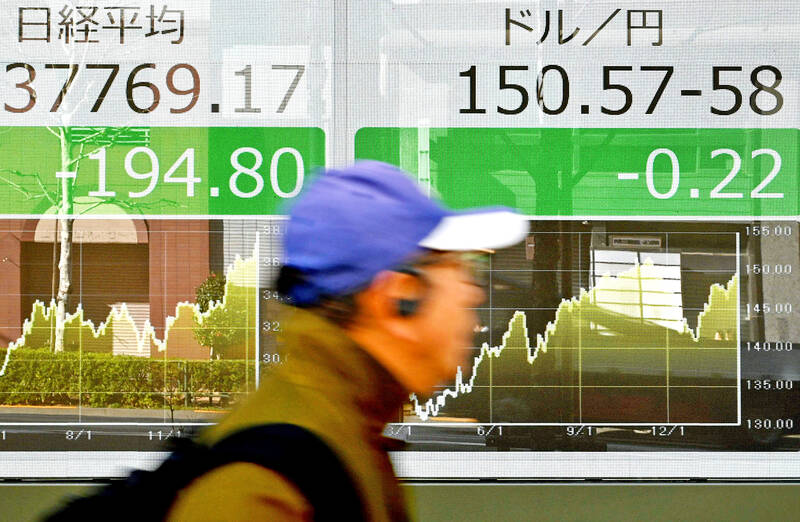Most Asian equities sank yesterday, tracking a sell-off on Wall Street, as a forecast-topping US inflation report dealt a hefty blow to hopes for an early interest rate cut.
The dimming prospects of a dovish turn by the US Federal Reserve also sent the US dollar surging against the yen, forcing Japanese officials to warn they would intervene in forex markets to support the country’s currency.
Expectations for a rate cut have been doused in recent weeks by a series of strong indicators — particularly on the economy and jobs — while several monetary policymakers warned they want to see more data before shifting.

Photo: AFP
However, stocks continued to push higher in that time, with analysts saying the Fed had indicated it is still on course to cut this year, even if not as much as previously hoped. A small downward revision last week to inflation figures for the final few months of last year added to the upbeat mood.
However, Tuesday’s figures showed the consumer price index (CPI) and core prices eased less than expected, which came as a severe blow, leading investors to re-evaluate their outlook for rates this year. US inflation rose 3.1 percent on an annual basis, above forecasts for a 2.9 percent increase.
Eyes are now on producer price data due at the end of the week.
All three main indices on Wall Street fell more than 1 percent, with the Dow and S&P 500 coming down from about record highs.
US Treasury yields jumped and the so-called “fear gauge” VIX index rose at its fastest clip since October last year.
The “CPI report caught a lot of people off guard”, Chris Zaccarelli of Independent Advisor Alliance said. “Many investors were expecting the Fed to begin cutting rates and were spending a lot of time arguing that the Fed was taking too long to get started — not appreciating that inflation could be sticky and not continue down in a straight line.”
Saxo’s Redmond Wong said: “The hot CPI report has priced out a March rate cut, now seen with only 10 percent odds.”
The “May rate cut probability has also dropped to less than 40 percent from around 70 percent previously and the first rate cut is only seen in June,” Wong said.
Stephen Innes at SPI Asset Management called it “a bitter pill.”
“Suppose the other top-tier data released this month shows a hotter trend similar to the CPI report. In that case, it’s unlikely that the Federal Reserve will cut interest rates in May,” Innes said.
Asian traders ran for cover, with Tokyo, Sydney, Singapore, Seoul, Wellington, Mumbai and Bangkok well down.
However, Hong Kong rallied as it reopened after an extended break for the Lunar New Year. Tech giants led the way on hopes China’s leaders might announce further measures to support the country’s markets and stuttering economy.
London edged up at the open as data showed UK inflation held at 4 percent last month. Paris and Frankfurt were down.
Officials in Tokyo said they were keeping a close eye on developments and were ready to step in to support their currency.
“Some of the recent rapid moves are in line with fundamentals, but some are clearly speculative. I think the latter aren’t desirable,” Japanese Vice Minister of Finance for International Affairs Masato Kanda said yesterday. “Authorities are ready to respond 24 hours a day, 365 days a year.”

Vincent Wei led fellow Singaporean farmers around an empty Malaysian plot, laying out plans for a greenhouse and rows of leafy vegetables. What he pitched was not just space for crops, but a lifeline for growers struggling to make ends meet in a city-state with high prices and little vacant land. The future agriculture hub is part of a joint special economic zone launched last year by the two neighbors, expected to cost US$123 million and produce 10,000 tonnes of fresh produce annually. It is attracting Singaporean farmers with promises of cheaper land, labor and energy just over the border.

US actor Matthew McConaughey has filed recordings of his image and voice with US patent authorities to protect them from unauthorized usage by artificial intelligence (AI) platforms, a representative said earlier this week. Several video clips and audio recordings were registered by the commercial arm of the Just Keep Livin’ Foundation, a non-profit created by the Oscar-winning actor and his wife, Camila, according to the US Patent and Trademark Office database. Many artists are increasingly concerned about the uncontrolled use of their image via generative AI since the rollout of ChatGPT and other AI-powered tools. Several US states have adopted

A proposed billionaires’ tax in California has ignited a political uproar in Silicon Valley, with tech titans threatening to leave the state while California Governor Gavin Newsom of the Democratic Party maneuvers to defeat a levy that he fears would lead to an exodus of wealth. A technology mecca, California has more billionaires than any other US state — a few hundred, by some estimates. About half its personal income tax revenue, a financial backbone in the nearly US$350 billion budget, comes from the top 1 percent of earners. A large healthcare union is attempting to place a proposal before

KEEPING UP: The acquisition of a cleanroom in Taiwan would enable Micron to increase production in a market where demand continues to outpace supply, a Micron official said Micron Technology Inc has signed a letter of intent to buy a fabrication site in Taiwan from Powerchip Semiconductor Manufacturing Corp (力積電) for US$1.8 billion to expand its production of memory chips. Micron would take control of the P5 site in Miaoli County’s Tongluo Township (銅鑼) and plans to ramp up DRAM production in phases after the transaction closes in the second quarter, the company said in a statement on Saturday. The acquisition includes an existing 12 inch fab cleanroom of 27,871m2 and would further position Micron to address growing global demand for memory solutions, the company said. Micron expects the transaction to